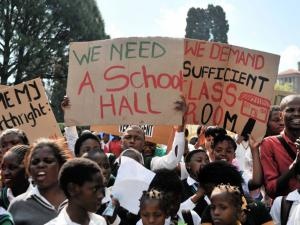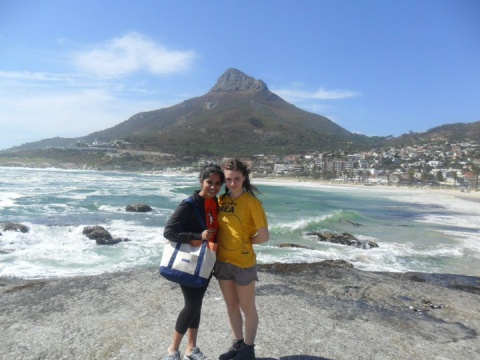
I am one of the volunteering tutors for IkamvaYouth in Maths and Science at the Makhaza branch and ever since I started helping out, which was about feb 2011, I have been enjoying every moment of it, absolutely have no regrets about nothing. One of the many reasons I devote a lot of my free time to helping these HighSchool children with their studies is because I was once a student in a disadvantaged school myself and I know what it’s like to have your dreams faded out by lack of study material or enough qualified teachers for science subjects, at the same time not affording Saturday classes and extra lessons. This can really make a student’s life difficult, and so I have decided to help the disadvantaged youth in any way I can academically and ikamvayouth is a good way of achieving that. I believe that without the youth, there is no tomorrow, and without educated youth there is no better tomorrow than today. We should all invest in their futures, not only for their sake but for the sake of humanity as well. I am also glad to have gone to my first SPW where me and other tutors had lots of fun collaborating with the most committed students in coming up with ideas to improve IY, during which I was given the opportunity to help out in other parts like the BranchComm, serving as the head of Operation Fikelela and also helping out with the administration of the ikamvayouth computer lab, along with some brilliant IY students who have a big interest in IT. There’s nothing better than somebody to look at you and say you’ve change their lives, and it’s just a privilege to teach these kids.


IkamvaYouth is happy to report that three ikamvanites were featured in the Mail & Guardian’s 200 Young South Africans list:
We’re looking forward to congratulating our first cohort of ex-learners to make the list in the future 🙂


At the beginning of every year, 1.3 million children begin school in Grade 1 but only 550 000 write Matric. Of these, only 68% will pass. And of these, 25% scrape through with 30s and 40s.
The effective Matric pass-rate in South Africa every year is thus actually closer to 29%.
And this is before we even begin to look at university retention rates and the spine-chilling FET college pass rates. I often say to people that as bad as you think the education landscape in South Africa is, it’s actually worse.
Which brings me to the conclusion that if this is not a YOUTH ISSUE then I don’t know what is.
There is surely no more pressing concern for young people across this country than the dismal state of education that every year systematically robs them of their futures.
How is it then that education will barely feature at this weekend’s ANC Youth League elective conference as representatives of the most influential youth movement in the country meet to discuss their plans for the next four years? Can we not see that the chains of poverty are firmly entrenched in the dysfunctionality of our schools? Do we not realise that the failure of our education system is causing as much damage as the race-based policies of old? Are we so blinded by our personal agendas so as to be unable to distinguish between what will alleviate poverty and what will entrench it?
The ANCYL is absolutely correct and justifed to point out that we need more equitable and more workable solutions to the massive problems of land reform, to righting past injustices and to creating broad-based economic inclusion in this country (you would have a hard time arguing against this) but without the provision of quality education any/every solution will be temporary at best and exascerbating at worst. We simply cannot end poverty without the access to quality opportunities that decent education provides. This is the bottom line and it is a mantra we should repeat over and over again until we are blue in the face – we should NEVER grow tired of saying this.
I guess what is especially puzzling is the assertion that nationalisation and wholesale land redistribution on its own is a solution to poverty. Any potential solution that is not also forward-looking and does not include improving education is tenuous at best. The hard truth is that there are not too many examples around the world, if any, where nationalisation has actually lessened the suffering of ordinary people. At best, the status quo remains the same and all that changes are the ‘elite’ at the trough. But on the contrary, there are countless examples of quality education acting as a springboard towards a better future not only for individuals but for an entire country – look no further than Singapore.
But we don’t even need to look that far, at IkamvaYouth we discovered that the average first pay-cheque of a learner who joins IkamvaYouth, who improves her school marks, who gets into university and who graduates after three years will be 5 times the collective income of her entire household when she first joined IkamvaYouth. It’s as simple as that. In 5 years the cycle of poverty in a family is broken and it’s broken on the back of decent education.
We really need more creative and imaginative thought from our leaders and especially from the ANCYL as the problem of dismal education is a YOUTH problem. The empty platitude that everyone is entitled to quality education is clearly not going to cut it. This really is thus nothing short of a desperate plea on behalf the voiceless hundreds of thousands of young people to make this the number 1 priority in all programmes post this year’s elective conference.
Finally, as this is Youth Day, June 16, we cannot but think of the young people of Soweto of 1976 who so courageously took to the streets and chanted slogans like “Liberation before Education” in front of an intimidating and ruthless foe. Today however, our minds must be unalterable in confronting a foe at least as intimidating and ruthless as before and we ask you to join us in declaring that now is the time of “Liberation through Education”.
Please consider volunteering at an IkamvaYouth branch near you.
Or if you can’t volunteer please consider a financial contribution towards ending poverty.
Or at the very least, please spread the word that we simply cannot end poverty without the access to quality opportunities that decent education provides and let’s hope that this finds traction in the corridors of influence.

* Photo: IkamvaYouth learners picket with Equal Education outside the Union Buildings in April 2011.

Name: Nisha
Where are you from? I’m from Georgia, in the United States.
How did you hear about Ikamva? Veronika and I came to South Africa with a college class in March and met with some of the learners then.
What were your favorite subjects in high school and why? I really enjoyed English, because I love reading.
Name: Veronika
Where are you from? I come from a small village in the south of the Czech Republic.
What were your favorite subjects in high school and why? I loved studying Czech history because it helped me understand my country and its people a lot better.
We’re looking forward to working with all of you for the next 5 weeks! We’re now busy planning for Winter School—its going to be awesome 🙂

The Social Entrepreneurship class of 2010 (SECP2010) recently graduated from the Gordan Institute of Business Sciences (GIBS) and among the graduates was IkamvaYouth’s Gauteng Coordinator Andrew Barrett.
What’s more, Andrew’s Action Learning Project (ALP) about “Scaling IkamvaYouth” was awarded best ALP for 2010. An executive summary of this report is listed here and if you are interested you can download it at the bottom of this article.

Andrew Barrett congratulated by Prof. Nick Binedell for best ALP on GIBS SECP 2010.
Executive Summary:
IkamvaYouth is remarkable not just in what it does but also in how it does it and central to the success of the IkamvaYouth model (so far) is the grassroots democratic emphasis that provides all IkamvaYouth stakeholders (i.e. the learners, coordinators and volunteers) with the tools to actively influence and shape their organisation.
This introductory report focuses on the challenge of scaling IkamvaYouth to achieve maximum impact while honouring the values that IkamvaYouth believes in.
In looking for solutions to this challenge there are a number of interesting examples in the theoretical literature of alternatives to a traditional (hierarchical) top-down approach and of particular interest is the fascinating Brazilian for-profit company, Semco. The democratic workplace environment espoused by Semco and the impressive results it achieves provide practical pointers of a possible way to locate power and control in the IkamvaYouth structures that will remain true to its grassroots origins.
One potential solution to the IkamvaYouth scaling challenge is to franchise the IkamvaYouth model in a way similar to that done by Habitat for Humanity and in so doing ensure that power and control remain vested at the local branch level with autonomous structures pursuing the key IkamvaYouth objectives in a way that maintains IkamvaYouth’s impressive results within a pre-defined IkamvaYouth framework.
It also appears that pursuing a non-hierarchical approach means that a type of servant leadership is inevitable and, further, that a value-based democratic organisational structure seems to offer a highly attractive option that fits this bill. It seems certain that considerations of this kind would have multiple implications for the structuring of the organisation but perhaps the most fundamental movement required is a mind-shift away from the mainstream traditional hierarchical worldview in exchange for an approach that better reflects the integrity of IkamvaYouth as a truly grassroots organisation not only in name but in structure as well.
Click here: for the full report.
In the Business Day this week (7 June 2011), economist Peter Montalto finds inspiration in the aspirations of Ikamvanites. Montalto refers to his experience of visiting the Nyanga branch of IkamvaYouth a couple weeks ago and the impact this has had on his perspectives of South Africa and how important it is that we foster aspiration in our impoverished communities.
He writes,
In Nyanga, Ikamva Youth is working in the heart of the community in a local library. An army of enthusiastic volunteers, many of whom went through the project themselves, and a close connection with local universities provide the drive behind the project, and the energy comes from the leaders. Visiting the project, I saw young people hungry to learn, help each other and take advantage of the services Ikamva offers them. Most interesting, though, was that at its heart the work Ikamva is doing and the difference it makes is very simple — it is about providing a spark of hope, a path of opportunity and role models to look up to, all triggering aspiration.
The most basic tragedy of the townships is not even high unemployment (about 60% in Nyanga) or the conditions — it is a lack of aspiration. The encouraging thing, which Ikamva Youth has shown, is that though role models and simply providing information (and implicit incentives) about what options are available for youngsters and what they can achieve in life by putting the effort in at school, this aspiration can be ignited, grades can be improved and lives can be enriched. Once aspiration has been sparked, a basic entrepreneurial spirit in those who live in the townships causes a multiplier effect and youngsters then want to work hard, giving up time after school to be part of the programme, and so have a larger part in driving their own destiny. Much of Ikamva’s work relies on volunteers, who have been through the programme and then want to return to give something back.
I met Phillip and Thobela, two young people who had grown up in the township, been through the charity’s programme at school, got good enough grades to go to university, and now volunteer with the charity and are going on to great things. As an economist, I was delighted to find a common understanding with Phillip, who is passionate about econometrics. He is doing well at university and looking to go on to, for want of a better word, a “normal job” using his interest in statistics for the government or a company. Thobela, who now sits on Ikamva’s board, is passionate about chemistry. Getting into a good university allowed him to go on a study exchange to the US, and he now wants to become an academic teaching what he loves, a bug he has caught from his experience with the charity. Creating role models can become a virtuous cycle.
From my visit, I learnt many things. The issue of “untapped potential” is a much broader concept for SA than I first imagined. Government policy must be geared to providing the incentives and structure for personal aspiration of youngsters through mentoring and additional support in schools.
For the full article, visit http://www.businessday.co.za/articles/Content.aspx?id=145012











 Lloyd Lungu
Lloyd Lungu